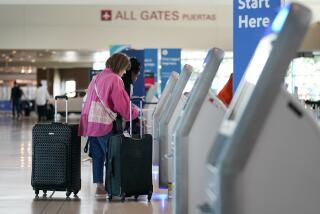Prosecutors Vow to Charge Airlines Using ‘Deceptive’ Ads
- Share via
NEW YORK — The head of an organization representing the attorneys general for all 50 states promised to prosecute airlines that promote bargain fares without clearly listing all the restrictions in the offers.
The National Assn. of Attorneys General announced that it started a crackdown on “deceptive” advertising by the nation’s airline industry.
“The consumers are very angry . . . over the barrage of often exaggerated offers of cheap fares and all across the country there will be a review of airlines’ advertisements,” said New York Atty. Gen. Robert Abrams, head of the national association.
His warning came the same day a series of guidelines endorsed by the association went into effect. The guidelines do not have the force of law, but they summarize existing state laws, Abrams said.
Prosecutors drafted the guidelines after they were hit with an increasing barrage of complaints from travelers who claimed they had been victimized by misleading ads, he said.
In many cases, Abrams said, travelers thought they qualified for a bargain fare only to find out after it was too late and that the discount “one-way” rate was only valid when a round-trip ticket was purchased.
Others found they were charged the higher non-bargain fare because the discount was only valid at one of two airports in the same city.
Under the guidelines, any newspaper ads must make “clear and conspicuous disclosure of restrictions” such as limited time availability and refund and exchange policies.
The nation’s airline industry reacted angrily to word the guidelines had gone into effect and predicted any attempt at forcing the industry to comply with them was doomed to failure.
Officials of the Air Transport Assn., a trade group representing 23 airlines in the United States and Canada, said Congress left the power to regulate airlines exclusively in federal hands.
But William Jackman, a spokesman for the trade group, said it was possible some airlines would voluntarily comply.
“It’s really up to the airlines whether they can live with them,” he said.
More to Read
Sign up for Essential California
The most important California stories and recommendations in your inbox every morning.
You may occasionally receive promotional content from the Los Angeles Times.











